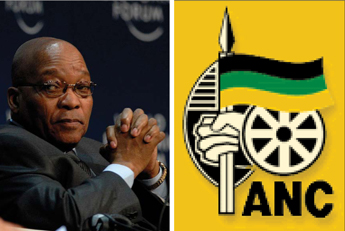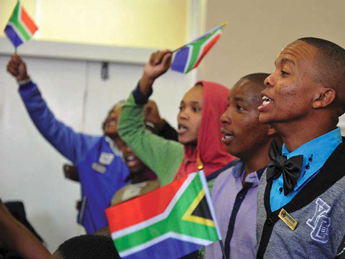Does long-term trouble loom for African National Congress?
By Jehron Muhammad | Last updated: Apr 7, 2014 - 9:59:10 AMWhat's your opinion on this article?

President Jacob Zuma
|
Not having a strong opposition has its merits. But winning an election won’t stem a growing tide of dissatisfaction among the electorate. Whether it’s passing legislation that requires those with limited means to pay an “e-toll,” or the president addressing the 100th anniversary of the South African Land Act with a broken promise of proposed land redistribution, dissatisfaction—evidenced by booing of President Zuma at Nelson Mandela’s memorial service—is on the rise.

|
To add insult to injury, a March 19 report by Public Protector Thuli Madonsela Nkandia report brought more bad news. According to eNews Channel Africa, “allegations of impropriety and unethical conduct relating to the implementation of security measures by the Department of Public Works at the private residence of the president” were made and the news quickly spread.
Concerning $21 million in government funds spent to upgrade President Zuma’s private residence that included construction of a swimming pool, an amphitheater, a cattle “kraal” and chicken “run” were beyond measures “required for his security,” said the author of the report. “The construction of these as well as extensive paving involves unlawful action and constitutes improper conduct and maladministration,” he said.
Actions required by the Public Protector include President Zuma paying a reasonable percentage of the total cost incurred by the State for construction that didn’t relate to security.

Post State of the Nation Address dialogue, 14 March 2014. Learners engage with Minister in the Presidency Collins Chabane during a Post State of the Nation Address (SoNA) dialogue at Westcol campus in Mohlakeng, Randfontein. Photo: www.gov.za/GCIS
|
Explaining his decision, President Zuma said, “There is no president in the DA. She must ask other premiers at her level to have a debate.” Business Day responded by such “logic, the only person Zuma would be willing to debate is himself, because there can only ever be one president at a time.”
Business Day thinks the debate would be good for the country, but “politically, however, the idea is fairly loaded with problems, and all of them for the ANC.”
While Zillie’s campaign seems to focus on highlighting Zuma shortcomings, Economic Freedom Fighters Party leader Malema appears to be shoring up support on the Left. In an unprecedented almost-marriage the EFF and the historic Pan African Congress formed a partnership. Alton Mphethi, who received a court ruling putting him in charge of the PAC, recently announced a formal “agreement of cooperation” between the two parties.
The Mail & Guardian reports that the “partnership isn’t quite a merger however, but there are hints of one in the future.” Mphethi says there isn’t time ahead of the election for the two parties to merge, but for now each party will “be the eyes and ears of each other in voting stations to ensure free and fair elections.”
Malema noted during a press conference to release his party’s candidate list for elections, that the “EFF and PAC share a common passion about the policy of land expropriation.”
According to the FT, the challenge that Mr. Malema poses at just 33-years-old is not at the electoral ballot box. By his own admission, his party lacks resources and some pollsters predict EFF will pick up no more than 8-10 percent of votes. What he represents instead is a generational challenge. “He is a clear warning sign of the looming battle for the hearts of young South Africans for whom opportunity—or the lack of it—is the priority,” said the newspaper.
In a damaging and just-released study, “Strengthening Governance in South Africa: Building on Mandela’s Legacy,” by the Annals of the American Academy of Political and Social Science, the ANC’s apparent complacency is taken to task.
The Wall Street Journal said the report found “that during the country’s 20-year stewardship by the ruling ANC, almost no net new jobs have been created. Unemployment runs at an official level of 25%, but a widely accepted unofficial level is 40%.”
To highlight how critical conditions are in South Africa on March 19 Numsa (the National Union of Metal Workers of South Africa), which broke with the ANC, launched its United Front against neo-liberalism across the country in “what could be months of rolling mass action for working-class struggles,” reported South Africa’s IOL News. The marches and one-day strike will mark “a significant move in what may be Numsa’s inevitable exit from the trade union federation Cosatu and the ANC-led tripartite alliance,” it added.
Jehron Muhammad, who writes from Philadelphia, can be reached at [email protected]. Follow him on Twitter @JehronnMuhammad.
INSIDE STORIES AND REVIEWS
-
-
About Harriett ... and the Negro Hollywood Road Show
By Rabiah Muhammad, Guest Columnist » Full Story -
Skepticism greets Jay-Z, NFL talk of inspiring change
By Bryan 18X Crawford and Richard B. Muhammad The Final Call Newspaper @TheFinalCall » Full Story -
The painful problem of Black girls and suicide
By Charlene Muhammad -National Correspondent- » Full Story -
Exploitation of Innocence - Report: Perceptions, policies hurting Black girls
By Charlene Muhammad -National Correspondent- » Full Story -
Big Ballin: Big ideas fuel a father’s Big Baller Brand and brash business sense
By Bryan Crawford -Contributing Writer- » Full Story






 Click Here Stay Connected!
Click Here Stay Connected!








